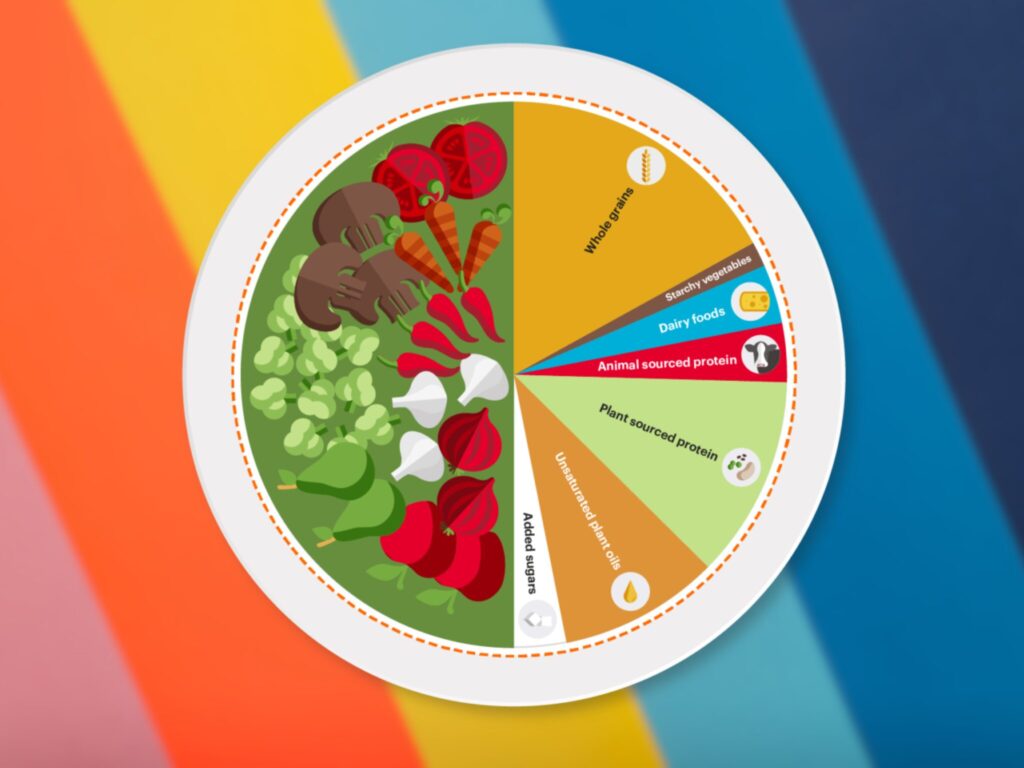Planetary Health Diet Linked to 30% Lower Risk of Premature Death & 29% Fewer Emissions
5 Mins Read
The first large-scale study to analyse the effects of the Planetary Health Diet has found a lower risk of premature death and a lighter impact on the climate.
Eating a primarily whole-food plant-based diet has tremendous benefits for humans and the environment, according to a new study led by the Harvard TH Chan School of Public Health.
Published in the American Journal of Clinical Nutrition, the research was inspired by the EAT-Lancet Commission’s Planetary Health Diet, which was designed in 2019 as a way to feed 10 billion people and keep the planet healthy by 2050. The diet advocates for more plants and whole foods, and less meat and dairy, with ample room for flexibility for different cultural and culinary preferences.
Ideally, the diet should comprise half a plate of fruits and vegetables, and the other half should contain mainly whole grains and plant protein sources, with optional modest amounts of animal protein.
The Harvard study is the first large-scale assessment of the impacts of the Planetary Health Diet, using the health data of 206,604 Americans over a period of 20 to 34 years. Participants were free of major chronic diseases at the start of the study, and completed questionnaires every four years.
The researchers found that the top 10% of people most closely adhering to the Planetary Health Diet represented a 30% lower risk of premature death than the bottom 10%. Meanwhile, those with the highest adherence also had significantly lower climate footprints, with a 29% reduction in greenhouse gas emissions.
“The findings show just how linked human and planetary health are. Eating healthfully boosts environmental sustainability – which in turn is essential for the health and wellbeing of every person on Earth,” said senior author Walter Willett.
Plant-forward diets lower risk of all causes of death

The participants were enrolled in long-term government studies, namely the Nurses’ Health Study I and II and the Health Professionals Follow-Up Study. The researchers scored their diets based on the intake of 15 food groups. Planet-friendly and resource-light foods included whole grains, tubers, vegetables, whole fruits, legumes, soy-based products, and unsaturated plant oils (like olive oil).
Meanwhile, foods that require much more land, like those derived from cattle, sheep, goats, pigs and poultry, were also assessed, as was the intake of added sugar.
The researchers suggested that, while other studies have also reported plant-based diets’ human and planetary benefits over animal foods, most have used one-time dietary assessments, which produce weaker results than when you look at diets over a longer period, which is what the team at Harvard did.
People following the Planetary Health Diet were found to have a lower risk of death from every major cause, including cancer (10% lower), cardiovascular diseases (14%), lung disease (47%), and Alzheimer’s and other neurodegenerative disorders (28%). Additionally, women who closely adhered to the diet had a 38% lower risk of death from infectious diseases.
Essentially, participants who followed the diet closely ate larger amounts of fruits and vegetables, nuts, legumes, whole grains, unsaturated fats and poultry, while reducing their intake of red and processed meats, eggs, soft drinks and fruit juices, as well as sugary processed foods like candy, cakes, breakfast cereals, and desserts.
In terms of animal foods, this diet recommends up to two servings per day. This could mean a typical week would entail a daily serving of a dairy product, a weekly serving of red meat as well as eggs, plus two weekly servings each of poultry and fish. This is much lower than the current consumption levels in the US – according to the USDA, Americans eat nearly 102kg of meat annually (excluding seafood), 6.5 times higher than the EAT-Lancet Commission’s recommendations.
USDA dietary recommendations ‘refuse to consider’ climate change

In terms of the environmental gains, the study revealed that the Planetary Health Diet requires 21% fewer fertilisers, 51% less cropland, and 13% less water and irrigation. Land use reduction is particularly vital to facilitate reforestation, which the authors said is “seen as an effective way” to reduce greenhouse gases – although the efficacy of reforesting programmes to offset emissions is sketchy at best.
That said, the results chime with existing literature about the climate impacts of animal-derived and plant-based foods. Livestock farming is responsible for up to 20% of all emissions – and, within the food system, meat accounts for 60% of emissions. Meat and dairy, meanwhile, emit twice as much CO2e as plant-based foods.
A previous study has similarly shown that swapping half of our meat and dairy consumption with plant-based analogues can reduce agricultural and land use emissions by 31%, lower water use by 10%, and effectively halt forest and natural land degradation.
“Climate change has our planet on track for ecological disaster, and our food system plays a major role,” said Willett. “Shifting how we eat can help slow the process of climate change. And what’s healthiest for the planet is also healthiest for humans.”
The Harvard study was observational, which meant its findings were based on correlations between people’s consumption habits and the risk of major diseases, instead of a cause-and-effect relationship. But the research did factor in the intake of alcohol, smoking, exercise, as well as family histories with medical conditions.
“What this study shows is that we can both shift our diets to be far healthier than the average American diet and also at the same time have a substantial impact on slowing down climate change,” Willett told the Washington Post. “We don’t have to trade off planetary health for human health. We can have both – it’s a double win.”
Willett went on to take aim at the USDA for its ignorance of climate change in its dietary recommendations, which are due to be updated next year. “Our study is noteworthy given that the US Department of Agriculture has refused to consider the environmental impacts of dietary choices, and any reference to the environmental effects of diet will not be allowed in the upcoming revision of the US Dietary Guidelines,” said Willett.
It must be noted that the current guidelines do urge Americans to avoid saturated fat, cholesterol, and red and processed meat, and focus on carbohydrate-rich plant-based foods. The document also mentions fortified soy-based dairy and meat products. The Physicians Committee for Responsible Medicine, an independent non-profit organisation, has criticised the inclusion of animal-based dairy, recommending water instead.



